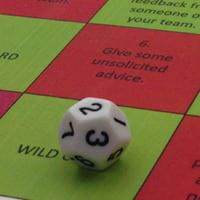Experiment Board Raises Strategy Lab Students’ Leadership Game
 Last quarter, Harry Davis, the Roger L. and Rachel M. Goetz Distinguished Service Professor of Creative Management at Chicago Booth and pioneer of experience-based education, introduced a new twist to his highly popular Strategy Lab course: Experiment Board, a new game comprising 40 percent of the students’ final grade. The other 60 percent is based on team work on actual client projects for AT Kearney, whose consultants serve as coaches to the teams.
Last quarter, Harry Davis, the Roger L. and Rachel M. Goetz Distinguished Service Professor of Creative Management at Chicago Booth and pioneer of experience-based education, introduced a new twist to his highly popular Strategy Lab course: Experiment Board, a new game comprising 40 percent of the students’ final grade. The other 60 percent is based on team work on actual client projects for AT Kearney, whose consultants serve as coaches to the teams.
Here’s how the game works: at the beginning of the quarter, students receive an envelope with a game board and 20-sided die inside. Numbers on the die correspond to different experiments, or action skills, that students are required to test that week. Students are instructed to roll the die on Sunday night to learn what behavior they will need to focus on that week. Examples include “play the devil’s advocate” or “show appreciation for someone on the team.” Some squares are deliberately left open, so the students can create their own experiments.
After deciding how their “experiment” will work, students conduct two separate trials with two separate teammates that week. At the end of each week, students are required to reflect and write about their experiments in an online form. Responses are compiled by Nathaniel Grotte, senior associate director for experiential learning.
“Several themes emerged from the students’ experiments,” says Davis. “People found that asking questions, listening, seeking feedback, and getting input from an outside source were critically important. Meaningful connections with others, such as showing warmth, asking for favors, or sharing something about one’s self were also important.”
One student working on active listening wrote, “I learned a tremendous amount more by paying attention to what the speaker was saying, rather than thinking about my next response or exchange. Active listening taps into a wealth of information that I had not previously anticipated.”
Another student experimenting with “asking someone how they really feel” also gained some valuable insights. “To my surprise, he took 2 to 4 seconds to think, and then started talking about how he has been facing a few challenges in his new venture and that has been creating difficulties in balancing his studies and work. He also talked about how much he appreciated this team and how we help each other. He went on talking about his aspirations and goals for business. At the end he said that he acknowledged many non-relevant things but he feels relieved and less stressed after the conversation.”
“We hope that these experiments will have lasting consequences,” says Davis. “The experiments get students to obtain input from outside sources and to gain more perspectives than they would otherwise. There are some experiments, such as engaging coaches or clients in unusual ways, or talking about something that’s undiscussable, or sharing a gut feeling. These things empower people to have richer conversations with people.”
The game approach represents a 25-year journey and evolution of thinking. In 1992, Davis and [then] colleague Robin Hogarth authored “Rethinking Management Education: A View from Chicago,” a seminal paper that argued that, in addition to teaching conceptual and domain knowledge, business schools should also help students acquire action and insight skills. This experimental approach to learning underlies much of Chicago Booth’s curriculum today.
“I think in our conceptual framework of leadership as well as in the Chicago tradition in general, we've always seen the benefit of generating more data and seeking disconfirming evidence,” says Davis. “The board teaches people to create exacting experiments and try things. Whether an experiment works or not, there’s still a lot of knowledge to be gained.”
Previously, Strategy Lab students were asked to work on just a few skills per quarter. Without the benefit of the board and an endless variety of possible options, students found constructing experiments difficult. Reflections, as a result, tended to be brief and less thoughtful.
In contrast, the “forced function” of rolling a die and doing what it says is more focused and rigorous. The goal, course readings convey, is to “strengthen ‘soft skills’ and provide more systematic support for students in helping them strengthen their interpersonal skills or heighten self-awareness.”
“What’s been surprising is the reports are substantive,” says Grotte. “They are taking creative ownership and experimenting with things. All you have to commit to doing is rolling the die. It’s kind of fun.”
By Lisa La Vallee